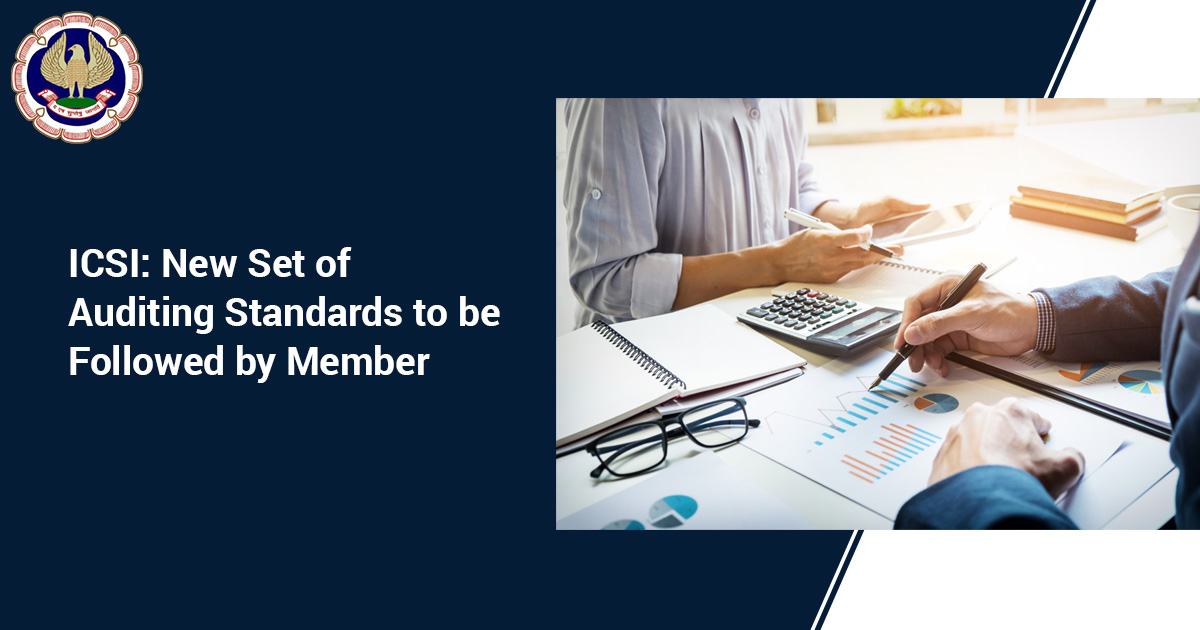
Institute of Company Secretaries of India (ICSI) has come up with the all-new set of protocols for Auditors in India. These new Auditing Standards will mandatorily be practiced from 1 April 2020 (just after the end of the current Financial Year).
The writeup aims at highlighting all the new Auditing Standards designed by the ICSI for near future audits.
From the standards listed below the first three standards can be referred for any kind of company audit but the fourth one is especially for the Secretarial Audit U/S 204 of Companies Act, 2013.
The applicability of the said Auditing Standards in every audit will be supervised by the Company Secretaries as they own expertise in auditing methods, tools and techniques. This will make the audit errorless, professional, uniform and fast.
Provincial Civil Services (PCS) can ask for the following audits:
- Secretarial Audit mentioned U/S 204 of the Companies Act.
- Annual Secretarial Compliance Report as per SEBI guideline
- Reconciliation Certificate mentioned under Regulation 76 of the SEBI Regulations 2018.
- 6 months certificates stating that all the share certificates were duly provided by the Registrar and Share Transfer Agent (RTA) within 30 days starting from the date of informing about share transfer in par with regulations of section 40(9) of SEBI guidelines.
- Certificate depicting the compliance conditions of corporate governance as mentioned under SEBI Listing Regulations.
- Half-yearly certificates confirming that 100% asset cover is maintained for non-convertible debt securities as mentioned in the regulation 56(d) of the SEBI Guidelines (Listing Obligations and Disclosure Requirements).
Guidelines on New Auditing Standards by ICSI
ICSI has issued a set of Guidelines on Auditing Standards that will clearly explain the audit process and real-time applicability/significance of provisions incorporated in ICSI Auditing Standards (recently introduced by ICSI w.e.f. 1 April 2020). The guidelines will thereon facilitate the concerned individuals with respect to document compliance. Not only that it will help the CS to enhance the quality and accuracy of the audit they are conducting.
Coverage:
- Applicable laws Identification and segregation
- Corporate conduct Verification and law compliance
- Board Composition
- Board Processes
- Systems and Processes
- Fraud Reporting
- Events/actions Identification and Reporting for Auditee’s affairs
Read Also : Important Factors to Help Build a Professional Company Secretary Website
Aim behind Reconstructing the Auditing Standards
Below are some prominent reasons for introducing the new auditing standards:
- Creating uniformity among the members while conducting the audit.
- There are different auditors involved in a single audit. For them to work in synchrony certain standards are set by the ICSI.
- Company Secretaries from all over the nation might have a common outlook on conducting the audits and must have a common standard for the preparation of reports to be submitted to authorities.
- Bringing in uniformity and professionalism in the ways of conducting the audits.
- Introduction of the Auditing Standards is expected to bring in solidarity in the corporate governance practices.
- Improve the level of applicability of laws and regulations while conducting the audit.
Explaining the New Auditing Standards:
CSAS-1- AUDITING STANDARD ON AUDIT ENGAGEMENT
Standards on Audit Engagement direct the auditors with their roles, powers and responsibilities while conducting the audits. The section contains guidelines on the process of coming into an understanding agreement with the Authorities for audit purposes. With effect from 1 April 2020, the standards will mandatorily be followed by the Auditors all over the countries.
AIM: To give a common set of principles and procedures to the auditors when it comes to conducting the audit. The entire accumulation of certified auditors is required by laws to follow the same Auditor Engagement Standards.
The Segment Covers
- Process of Audit Engagement
- Limits on audit engagements
- Confidentiality of information
- Conflict of Interest
- Amendments in terms of Audit Engagement.
Key Points To Remember
It decides the roles, responsibilities, powers, and process to be followed by the Auditors while conducting the Audits. A single format is set that is to be followed by the Auditors all over the country.
- The procedure of entering into the agreement with the Appointing Authorities for the purpose of Audits is also given under this section.
- The certificate given by the Appointing Authorities (permitting him/her to conduct the audit) shall mandatorily be furnished by the Auditor before starting with the audit.
- The auditor must carry with him the Audit Engagement letter accompanied by the copy of the resolution passed (if any) by the Appointing Authority as the proof of acceptance by the Authority.
- The Auditor is hereby required to inform the previous Auditor in writing regarding the acceptance of Audit Engagement.
- Ensure that such engagement is within the limits prescribed by ICSI from time to time. Make sure that the audit engagement duly follows the limits set by ICSI. Any violations may lead to adverse circumstances.
2. CSAS-2: Auditing Standard on Audit Process and Documentation
Protocols set for the Audit process and Documentation are mentioned under this section. The particular segment takes care of the audit process and preparation of documents done by the auditors. Again it is the list of instructions to the Auditor which he/she needs to follow without fail in order to successfully accomplish the process of Audit.
The auditor must follow the instructions while doing paperwork for the audit from start till the end so that there is no chance of rejecting the prepared documents. The section is applicable on a mandatory basis from 1 April 2020.
AIM: The main aim of the section is to allot the basic principles regarding the audit process and documentation to be followed by the auditors. The same set of rules shall be followed by the auditors all over India while going with the process of the audit and document preparation.
- Code of Audit conduct
- Rules related to audit paperwork.
- Proofs related to the documents attached to the Auditor’s reports.
- Proofs justifying that the audit process was in line with the applicable norms of Auditing designated by the government and that no rule is violated by any of the parties while conducting the audit.
The Segment Covers:
#1. Details of the Auditee
#2. Audit Planning
#3. Risk Assessment
#4. Check-lists
#5. Pooling and then validating the Audit Proofs
#6. Confirmation from the third party
#7. Preparing the reports
#8. Maintaining the records and preserving them for future reference
Key Points to Remember
- The segment sets the standard protocols related to conducting the audits as well as preparing the documents accordingly.
- The list of evidence needed to prove the authenticity of the reports prepared and maintaining the records for reference in future audits.
- Make a format according to which the audit will be conducted keeping in mind the norms of Audit Engagement. Stick to the audit plan.
- Risk assessment of the Auditee with respect to and connected/relevant to the Audit Engagement shall be done considering industrial & business environment, organizational structure and compliance requirements.
- Gather the documentation for records within 45 days starting from the date of signing the auditor’s reports.
3. CSAS-2: Auditing Standard on Opinion Forming
The section deals in the basic etiquettes that might be used by the auditor while forming an opinion on the subject matter of the audit. The standard is applicable only when the Audit Engagements are accepted by the Auditor. Or when it comes in effect i.e. 1 April 2020 onwards.
AIM: The list of protocols under this segment are set to facilitate the auditor with the standard etiquette for evaluation of the conclusions fetched from the Evidence acquired by them and express their opinion on the same in a writing.
The Segment Covers:
1. Standards for forming an opinion.
2. Precedence and Practices
3. Opinion in a written form from the third party.
4. Form of the Opinion
5. Auditor’s Responsibility
6. Report Format
Key Points to remember
- The section focuses on the manner in which the conclusions are to be drawn from the Evidence and extending the Auditor’s opinions on the subject matter of the Audit.
- Thoroughly study all the pieces of audit evidence before finally submitting the audit reports.
- Keep in mind the time limit allotted for the preparation of audit reports.
4. CSAS-2: Auditing Standard on Secretarial Audit
The segment focuses on the basic etiquettes to be followed while carrying out Secretarial Audit u/s 204 of the Companies Act, 2013 and SEBI (Listing Obligations and Disclosure Requirements), 2015. The standards for Secretarial Audit Engagements will mandatorily be followed by all the auditors from 1 April 2020 onwards.
AIM: The standard is set with the aim to regularize the statutory compliances and corporate conduct at the time of Secretarial Audit made as per section 204 of the Companies Act, 2013 and SEBI (Listing Obligations and Disclosure Requirements), 2015.
The Segment Covers
1. Identifying and validating the applicable laws.
2. Verifying the corporate conduct and compliance of laws.
3. Board Composition
4. Board Processes
5. Fraud Reporting (if any)
6. Analyzing and Bringing forth the actions having a major relation with Auditees Affairs.
Key Points to remember
- The etiquettes (‘the Standard’) to be followed by the Auditors while conducting the ‘Secretarial Audit’ under Section 204 of the Companies Act, 2013.
- Review Memorandum of Association, Articles of Association, statutory books, disclosure by the auditee etc.
- Standards are set to regularize the evaluation of statutory compliances and corporate conducts.
- The Auditor shall keep a note of the industry laws and other relevant laws that may be applicable to the Auditee based on the identification/segregation done by the Management or as a conclusion of his own verification.
- The final report/judgment given by the Auditor shall not be biased and the auditor is required to maintain a certain level of professionalism throughout the audit or while planning for the audit.
- The reports of frauds or bugs shall duly be reported based on the provisions of Section 143(12) of the Companies Act, 2013 read with Companies (Audit and Auditors) Rules, 2014.
Conclusion
The aforesaid Auditing Standards issued by ICSI are not yet included in as legal verses in the Companies act 2013 unlike Secretarial Standard-1 and Secretarial Standard-2 that have a separate section i.e., sub-section 10 of section 118 under Companies Act 2013 (the provisions under these sections describe the Secretarial Standards with regards to conducting General and Board Meetings specified by ICSI).
Auditing standards are introduced by ICSI with the aim of regularizing the audit conducts and to have a single protocol for the auditors all over the country.








